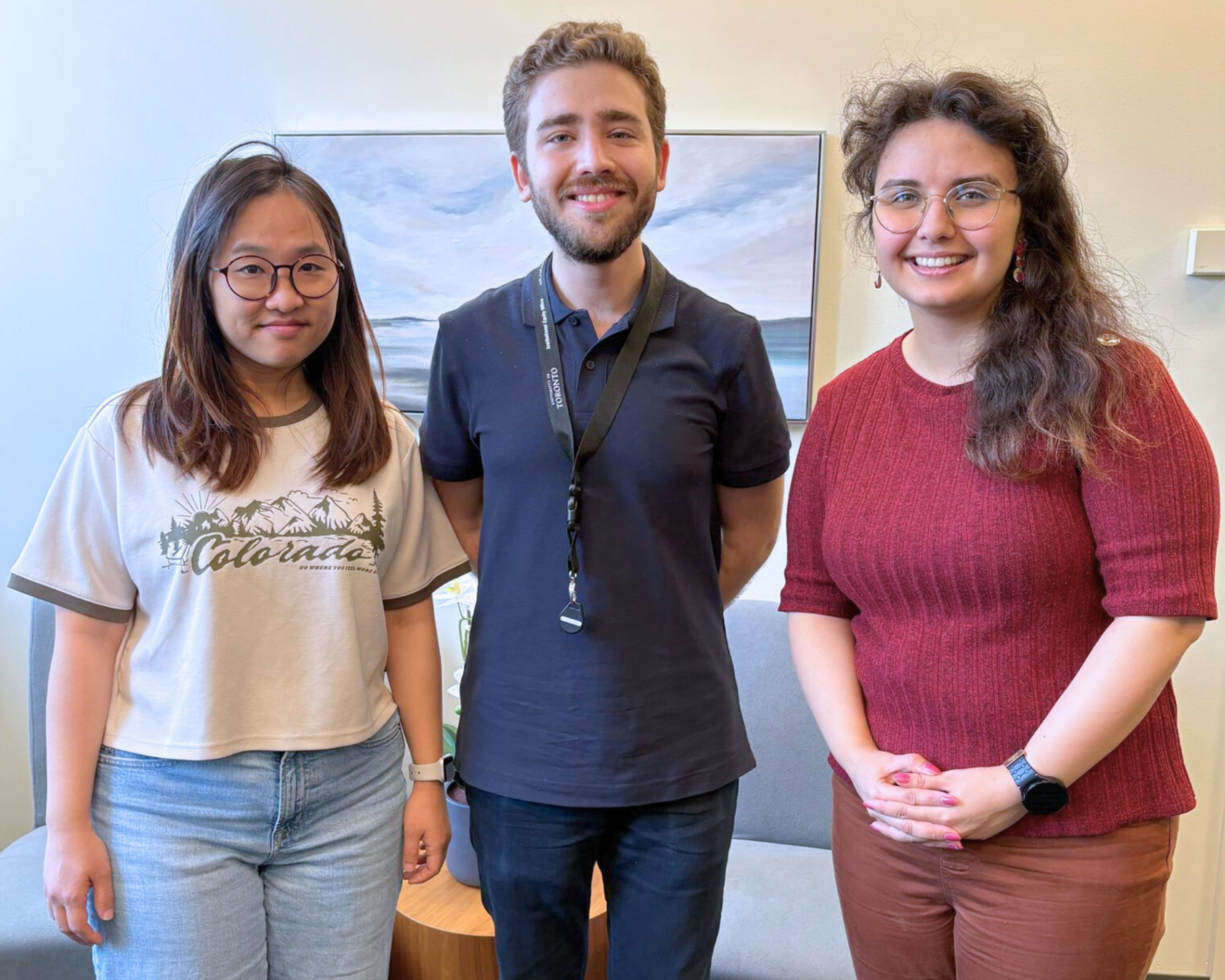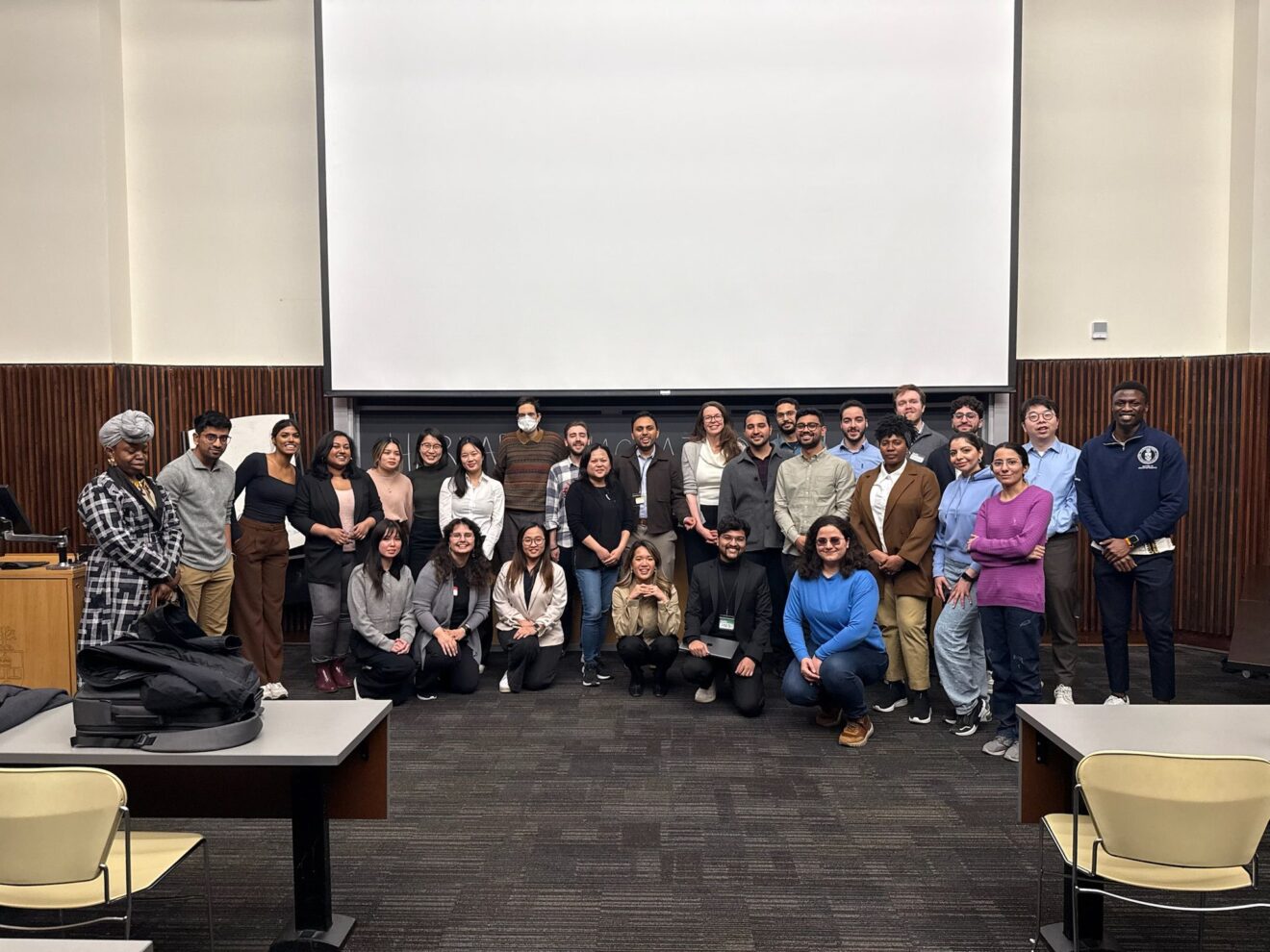A weekend of innovation and collaboration propelled Team Looped, a group of emerging health leaders from IHPME onto the global stage, as the winners of the 6th annual Health Systems AI Hackathon advanced to the top 10 teams worldwide.

By: Marielle Boutin
The Hackathon, held on April 11-12, 2025, and co-led by the Harvard Health Systems Innovation Lab and IHPME, brought together students, researchers, and professionals to develop AI solutions for healthcare challenges.
The event boasted 3,500 participants worldwide across multiple city-based hubs, and invited teams to pitch AI-powered solutions under the theme “Building High-Value Health Systems: Leveraging Artificial Intelligence.”
Team Looped, an IHPME-affiliated group, claimed first place at the Toronto Hub.
Kamyar Kazari, and Nway Nway (Lily) Aung —MSc HSR students in the AI Emphasis, and Laleh Rashidian, PhD HSR student in the Health Services Outcomes and Evaluation Emphasis —are building a solution that uses AI to automate insulin pumps to allow for minimal user input, reducing the daily burden on diabetes patients and contributing to better quality of life.
“The AI Stream at IHPME equips students with technical and strategic skills to build real-world AI solutions for complex health challenges,” says Dr. Zahra Shakeri, AI Emphasis Lead. “With a growing group of interdisciplinary learners, it’s becoming a leading hub for applied health AI talent. Successes like Team Looped show the calibre of innovation being cultivated, and we look forward to welcoming the next cohort of world-class learners.”

Following their success at the Toronto Hub, Team Looped received intensive coaching and bootcamp training from Harvard faculty and experts before successfully pitching to a panel of Harvard judges, securing their spot as the only Canadian team in the top ten teams worldwide.
The team is now moving into the final stages of the global competition, where they will undergo another four-week venture building immersion program to further refine their ideas and prepare for a final pitch to Harvard judges. If they are selected for the next stage, they will have the opportunity to pitch their solution to investors, including venture capitalists.
“This would be a crucial step toward turning our idea into a real-world solution,” says Aung. “If we are able to attract investors who believe in the potential of our innovation, we could secure funding to further develop and scale our product. It will definitely be an exciting opportunity for our team to move from concept to impact.”
Driven by a shared passion for applying AI to healthcare, Kazari and Aung formed the team before bringing on Rashidian.
“From the moment I decided to participate in the challenge, I knew that building a diverse team was essential,” says Kazari. “By bringing Lily and Laleh on board, I was able to merge deep AI expertise with strong clinical insight – exactly the kind of synergy I believed would position us to make a meaningful impact.”
The team brings together a unique blend of technical, clinical, and public health expertise. Kazari, an AI engineer and Vector Institute Scholar, draws on his background in computer engineering AI for public health research. Aung, who previously earned a master’s degree in Knowledge Engineering (Artificial Intelligence Systems) from the National University of Singapore, has over five years of industry experience in AI and is passionate about using medical imaging and Large Language Models (LLMs) to improve patient outcomes. Rashidian, guided by her clinical insight and public health background, contributes deep insight into health systems through her work evaluating care strategies across Ontario.
Despite never having worked together before, the team quickly fell into a rhythm, discovering that meaningful innovation can happen when diverse perspectives come together.
“Working with Kamyar and Nway Nway (Lily), both of whom have a wealth of experience in AI has been amazing,” says Rashidian. “The team complements each other beautifully, in a way that I don’t think any of us initially expected, seeing as it was our first time working together. Talking through how to bring this idea to life has been my favourite part of this process.”
This team-first approach proved essential as they advanced to the next stage of the competition, experiencing major perspective shifts and moving beyond technical development to consider the broader systems and real-world impact of their solution. With guidance from Harvard faculty and industry experts, team Looped learned how to frame their innovation through both a business and health equity lens, to explore not just how it works, but why it matters and who it can help.
After the intensity of presenting to a panel of Harvard judges and earning a spot among the top 10 teams worldwide, Team Looped can now appreciate the value of stepping outside of one’s comfort zone and embracing the collaborative and interdisciplinary nature of challenges such as the AI Hackathon. The key takeaway? Remain curious, embrace diversity and feedback, and enjoy the process.
Related News

Sign up for IHPME Connect.
Keep up to date with IHPME’s News & Research, Events & Program, Recognition, e-newsletter.
Subscribe to Connect Newsletter
Get in Contact
Communications
Marielle Boutin
Email Address: ihpme.communications@utoronto.ca





